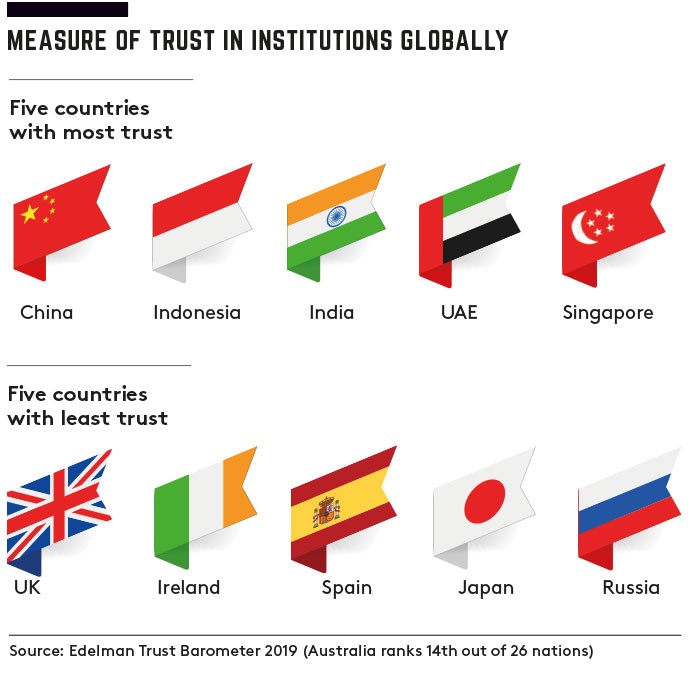Australia's lack of trust in government and media will impact the trade, investment and finance sectors, says AICD's chief economist Mark Thirlwell.
The late American economist Kenneth Arrow once emphasised the centrality of trust to economics, noting that: “Virtually every commercial transaction has within itself an element of trust, certainly any transaction conducted over a period of time. It can be plausibly argued that much of the economic backwardness in the world can be explained by the lack of mutual confidence.”
Arrow also argued that ethics — in the form of trust and related values — can work as an effective remedy for market failures associated with the presence of private information (think, for example, of adverse selection and moral hazard in markets for insurance).
Importantly, that can also work in reverse. One way of viewing the 2008 financial crisis triggered by the collapse of Lehman Brothers, for example, is as a particularly powerful study of what can happen to financial markets — and economies — when trust evaporates. More generally, low levels of trust can have large, indirect impacts on consumption and investment decisions through increased political, policy and regulatory uncertainty.
There are strong, positive correlations between measures of national trust levels (as captured, for example, by the World Values Survey) and both the level and growth rate of countries’ income per head. Causation could run both ways: high levels of prosperity could contribute to a society’s overall level of trust, perhaps serving as an indicator “all is well”.
When it comes to Australia and trust, the news is mixed. According to the Edelman Trust Barometer 2019, trust in key Australian institutions — business, government, non-government organisations (NGOs) and the media — jumped by eight points over the 2018 outcome. The bad news is that Australia’s score for 2019 was still only 48 per cent, indicating respondents remained distrustful overall. By subcomponent, government (42 per cent) and the media (40 per cent) were both distrusted by respondents, while business (52 per cent) and NGOs (56 per cent) were rated neutrally. No sector scored the 60 per cent or higher that indicates trustworthiness.
This is consistent with other measures. For example, Australian Election Study data shows a fall in the share of respondents saying that people in government can be trusted, sliding from 48 per cent in 1996 to 26 per cent in 2016. Similarly, a 2018 Australian Values Survey found 19 per cent of respondents had no confidence at all in the federal government while an additional 51 per cent did not have very much confidence.

While Canberra may be underperforming when it comes to trust, it’s not alone. The media scores even worse, according to Edelman. Most obviously, the banking Royal Commission and the behaviour it has uncovered has taken a heavy toll on trust in the financial services sector. Even before Commissioner Hayne’s final report was released, last year’s Deloitte Trust Index found 21 per cent of respondents believed banks had their customers’ interests at heart; 26 per cent thought they would keep their promises.
Declines in trust can therefore come with significant political and economic fallout. When voters lose confidence in traditional politics, they can turn to radical alternatives, with potentially unpredictable consequences for policy outcomes and the overall business environment (think Brexit or the rise of the populist right in Europe). Policymakers may find it increasingly difficult to sell complex policies to sceptical electorates, risking a trend deterioration in the overall quality of policy. When consumers lose confidence in business, they are likely to seek major changes to the regulatory environment to deliver the protections they feel are required.
In a lower-trust world, businesses, consumers and voters risk an unpalatable mix of more uncertainty, poorer economic outcomes, more unpredictable politics, increased red tape and a weakening of social ties. All of which means that maintaining the institutions, governance, regulatory frameworks and behavioural standards that support trust is a critical task for any successful society, including ours.
Latest news
Already a member?
Login to view this content


